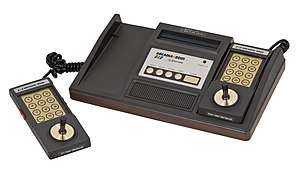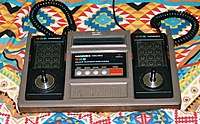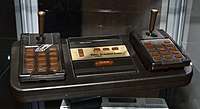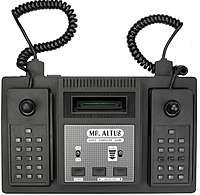Arcadia 2001
Arcadia 2001 is a second-generation 8-bit home video game console released by Emerson Radio in May 1982 for a price of US$ 99,[2] several months before the release of ColecoVision. It was discontinued only 18 months later, with a total of 35 games having been released.[2] Emerson licensed the Arcadia 2001 to Bandai, which released it in Japan.[2] Over 30 Arcadia 2001 clones exist.
 | |
 An Arcadia 2001 | |
| Manufacturer | Emerson Radio |
|---|---|
| Type | Home video game console |
| Generation | Second generation |
| Release date | May 1982[1] |
| Lifespan | 18 months |
| Introductory price | US$99 |
| Discontinued | 1984 |
| Media | ROM cartridge |
| CPU | Signetics 2650 |
| Memory | 1 KB RAM |
| Graphics | 128 × 208 / 128 × 104, 8 Colours |
| Controller input | 2 x Intellivision-style controller (12 button keypad and 'fire' buttons on the sides) |
| Power | 12 volt |
The unrelated Arcadia Corporation, manufacturer of the Atari 2600 Supercharger add-on, was sued by Emerson for trademark infringement. Arcadia Corporation then changed its name to Starpath.[3]
Description
The Arcadia is much smaller than its contemporary competitors and is powered by a standard 12 volt power supply so it can be used in a boat or a vehicle. It also has two outputs (or inputs) headphone jacks on the back of the unit, on the far left and far right sides.
The system came with two Intellivision-style controllers with a 12-button keypad and 'fire' buttons on the sides. The direction pads have a removable joystick attachment. Most games came with BoPET overlays that could be applied to the controller's keypads. The console itself had five buttons: power, start, reset, option, and select.
There are at least three different types of cartridge case styles[4] and artwork, with variations on each. Emerson-family cartridges come in two different lengths (short and long) of black plastic cases.
Technical specifications

- Main Processor: Signetics 2650 CPU (some variants run a Signetics 2650A)
- RAM: 1 KB
- ROM: None
- Video display: 128 × 208 / 128 × 104, 8 Colours
- Video display controller: Signetics 2637 UVI @ 3.58 MHz (NTSC), 3.55 MHz (PAL)
- Sound: Single Channel "Beeper" + Single Channel "Noise"
- Hardware Sprites: 4 independent, single color
- Controllers: 2 × 2 way
- Keypads: 2 × 12 button (more buttons on some variants)
Console variants and clones
Many variants and clones of the Arcadia 2001 have been released by various companies in different countries. These systems are mostly compatible with each other. In 1982, the Bandai Arcadia was released only in Japan. Four exclusive games were released for the system.
| Name | Manufacturer | Country | Compatibility family | Image |
|---|---|---|---|---|
| Advision Home Arcade | Advision | Emerson console | ||
| Arcadia | Bandai | Emerson console | ||
| Arcadia 2001 | Emerson | Emerson console |  | |
| Cosmos | Tele-Computer | Emerson console | ||
| Dynavision | Morning-Sun Commerce | MPT-03 console | ||
| Educat | unknown | MPT-03 console | ||
| Ekusera | P.I.C. | MPT-03 console | ||
| Hanimex MPT-03 | Hanimex | MPT-03 console | ||
| HMG-2650 | Hanimex | Emerson console |  | |
| Home Arcade Centre | Hanimex | Emerson console | ||
| Intelligent Game MPT-03 | Intelligent Game | MPT-03 console | ||
| Intercord XL 2000 System | Intercord | Emerson console | ||
| Intervision 2001 | Intervision | Ormatu console |  | |
| ITMC MPT-03 | ITMC | MPT-03 console | ||
| Leisure Vision | Leisure-Dynamics | Emerson console | ||
| Leonardo | GiG Electronics | Emerson console | ||
| Home Entertainment Centre Ch-50 | Inno-Hit | ? | ||
| Ormatu 2001 | Ormatu Electronics BV | Ormatu console |  | |
| Palladium Video-Computer-Game | Neckermann | Palladium console | ||
| Polybrain Video Computer Game | Polybrain | Palladium console | ||
| Poppy MPT-03 Tele Computer Spiel | Poppy | MPT-03 console | ||
| Prestige Video Computer Game MPT-03 | Prestige | MPT-03 console | ||
| Robdajet MPT-03 | MPT-03 console | |||
| Rowtron 2000 | Rowtron | MPT-03 console | ||
| Schmid TVG-2000 | Schmid | Emerson console | ||
| Sheen Home Video Centre 2001 | Sheen | Ormatu console | ||
| Soundic MPT-03 | Soundic | MPT-03 console |  | |
| Mr. Altus, Tele Gehirn(tele brain) | HGS Electronic | Palladium console |  | |
| Tele-Fever | Tchibo | Emerson console |  | |
| Tempest MPT-03 | Tempest | MPT-03 console | ||
| Tobby MPT-03 | Tobby | ? | MPT-03 console | |
| Trakton Computer Video Game | Trakton | Palladium console | ||
| Tryom Video Game Center | Tryom | MPT-03 console | ||
| Tunix Home Arcade | Monaco Leisure | Emerson console | ||
| UVI Compu-Game | Orbit Electronics | Orbit console | ||
| Video Master | Grandstand | Orbit console |
Bandai Arcadia
 | |
| Manufacturer | Bandai |
|---|---|
| Type | Video game console |
| Generation | Second generation |
| Media | ROM cartridge |
| CPU | Signetics 2650 @ 3.58 MHz |
| Predecessor | Bandai Super Vision 8000 |
| Successor | Bandai RX-78 |
In 1982, the Bandai Arcadia, a variant of the Emerson Arcadia 2001, was licensed and distributed to Japan by Bandai for a price of 19,800 yen.[2] There were four Japan-exclusive games released by Bandai.
- Doraemon
- Dr. Slump
- Mobile Soldier Gundam
- Super Dimension Fortress Macross
Reception
After seeing the Arcadia 2001 at the summer 1982 Consumer Electronics Show, Danny Goodman of Creative Computing Video & Arcade Games reported that its graphics were similar to the Atari 2600's, and that "our overall impression of the game play was favorable for a system in this price range, though no cartridge stands out as being an exciting original creation". He called the controller offering both Intellivision-like disc and joystick functionality "A great idea".[5]
Games
Emerson planned to launch the console with 19 games.[5] Some Arcadia 2001 games are ports of lesser-known arcade games such as Route 16, Jungler, and Jump Bug, which were not available on other home systems.
Emerson actually created many popular arcade titles including Pac-Man, Galaxian and Defender for the Arcadia, but never had them manufactured as Atari started to sue its competitor companies for releasing games to which it had exclusive-rights agreements.[6] Early marketing showed popular arcade games, but they were later released as clones. For instance, the Arcadia 2001 game Space Raiders is a clone of Defender, and Breakaway is a clone of Breakout.[7]
List of games
There are 47 games known to have been released for the Arcadia 2001 and its clones.
- 3D Attack - a Zaxxon clone[8]
- 3-D Bowling - a Bowling game released for the Arcadia by Emerson Radio Corp. in 1982.
- 3-D Raceway - 3D Raceway
- 3-D Soccer - a Soccer game released by Emerson Radio Corp. for the Arcadia in 1982.
- Alien Invaders - is a Shoot-'Em-Up game released by Emerson Radio Corp. for the Arcadia in 1982.
- Astro Invader
- American Football - is a Football game released by Emerson Radio Corp. for the Arcadia in 1982.
- Baseball
- Brain Quiz
- Breakaway
- Capture
- Cat Trax
- Crazy Gobbler
- Crazy Climber (unreleased)
- Escape
- Funky Fish
- Galaxian
- Grand Prix 3-D
- Grand Slam Tennis
- Hobo
- Home Squadron
- Horse Racing (plays similar to the Intellivision version)
- Jump Bug
- Jungler
- Kidou Senshi Gundamu (only in Japan)
- Math Logic
- Missile War
- Ocean Battle
- Pleiades
- RD2 Tank
- Red Clash
- Robot Killer (clone of Berzerk)
- Route 16
- Soccer
- Space Attack
- Space Chess
- Space Mission
- Space Raiders
- Space Squadron
- Space Vultures
- Spiders
- Star Chess
- Super Bug
- Super Gobbler
- Tanks A Lot
- The End
- Turtles/Turpin
References
- Forster, Winnie (2005). The encyclopedia of consoles, handhelds & home computers 1972 - 2005. GAMEPLAN. p. 57. ISBN 3-00-015359-4.
- Watcher, Dark. "Emerson Arcadia 2001 - DW Facts". Video Game Console Library. Retrieved 6 January 2014.
- The Dot Eaters - Epyx | The Dot Eaters
- obsoletemedia.org: Emerson Arcadia 2001 (1982 – 1984)
- Goodman, Danny (Spring 1983). "Home Video Games: Video Games Update". Creative Computing Video & Arcade Games. p. 32.
- "Arcadia 2001: Frequently Asked Questions". digitpress.com. 2002-06-04. Retrieved 2017-03-01.
- Lester, John. "History of Consoles: Arcadia 2001 (1982)". Gamster81. Retrieved 6 January 2014.
- "Arcadia 2001 Gaming Guide".
External links
| Wikimedia Commons has media related to Arcadia 2001 and clones. |
- Video Game Console Library entry on the Arcadia 2001
- TheGameConsole.com entry on the Arcadia 2001
- The Dot Eaters entry on the Arcadia 2001
- www.old-computers.com Emerson Arcadia 2001 museum entry
- www.old-computers.com Article about Arcadia 2001 and clones
- Arcadia 2001 retrospective at IGN